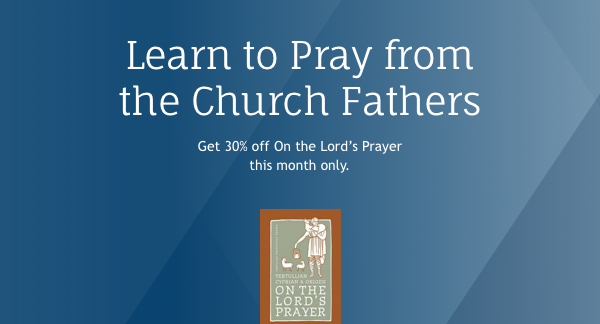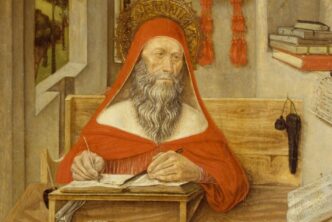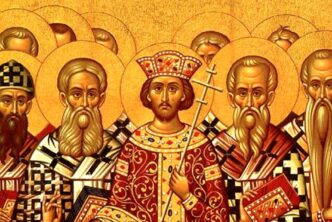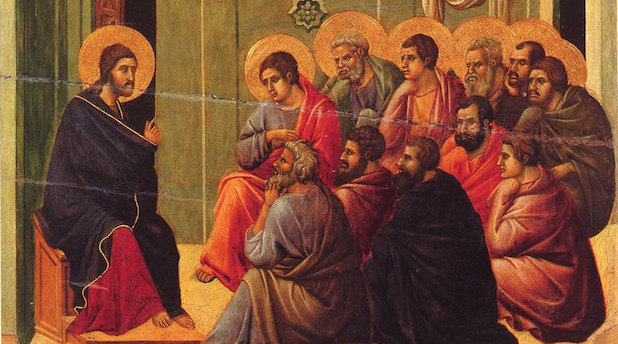 In On the Lord’s Prayer, three early church fathers—Tertullian, St. Cyprian, and Origen—explore the Lord’s Prayer and its role in the Christian life. In the excerpt below, Tertullian compares prayer before and after the coming of Christ and calls all Christians everywhere to pray fervently. The excerpt’s original wording has been preserved.
In On the Lord’s Prayer, three early church fathers—Tertullian, St. Cyprian, and Origen—explore the Lord’s Prayer and its role in the Christian life. In the excerpt below, Tertullian compares prayer before and after the coming of Christ and calls all Christians everywhere to pray fervently. The excerpt’s original wording has been preserved.
For what will God, who so demands, deny to a prayer that derives from the spirit and the truth (John 4:24). We read and we hear and we believe in the greatness of the witnesses to its efficacy.
Indeed, the old prayer brought deliverance from fire and from wild beasts and from starvation, even though it had not been given shape by Christ. How much more effective, then, is the Christian prayer? It does not situate the angel of dew in the middle of the fire (Dan 3:49–50), nor blocks the mouth of lions (Dan 6:22), nor brings a peasant’s dinner to the hungry (Bel 33)*. By delegated grace it turns away no feeling of pain, but it arms with endurance those who are suffering and knowing pain and grieving. It increases grace with bravery so that faith might know what it obtains from the Lord, understanding what it is suffering for the sake of the name of the Lord.
But in times of old prayer summoned plagues (4 Kings 6:18), put to flight enemy armies (Exod 17:8), withheld the benefits of rain (James 5:17). But now the prayer of justice turns away the entire anger of God, keeps watch on behalf of foes, makes supplication for persecutors. Is it a wonder that it knows how to wring water from the heavens, seeing that it would once ignite flames (3 Kings 18:38)? Prayer alone conquers God.
But Christ has no desire that it should do any evil deed; he has conferred upon it every power of doing good. Therefore it knows only how to call back the souls of the departed from the journey of death itself, to strengthen the weak, to restore the sick, to cleanse the possessed, to open the doors of prison, to loosen the chains of the innocent. The same prayer absolves sins, repels temptations, puts down persecutions, strengthens the weak-hearted, delights the high-minded, leads wanderers home, soothes the waves, confounds robbers, feeds the poor, governs the rich, lifts up the fallen, supports the unsteady, holds firm those who stand. Prayer is the buttress of faith, our armor and weaponry against the enemy that watches us from every side.
So never let us set out unarmed—let us remember the station by day and the vigil by night. Let us guard the standard of our emperor armed with prayer, awaiting the trumpet of the angel while we pray. Indeed, every angel prays, every creature. The herds and the wild beasts pray and bend their knees, coming forth from byres and dens looking to heaven, giving movement to the spirit after their fashion with animated mouths. And even now the birds arise, lifting themselves to heaven, spreading out their wings like a cross whilst uttering what appears to be a prayer.
What more might be said on the duty of prayer? Even the Lord himself prayed, and to him be honor and might for ever and ever.
***
Get On the Lord’s Prayer now for 30% off, and check out other deals in August’s Monthly Sale.
This post has been adapted from Tertullian, Cyprian, and Origen. On the Lord’s Prayer. (A. Stewart-Sykes, Trans.) Crestwood, NY: St. Vladimir’s Seminary Press, (2004).
*Bel and the Dragon are a set of short stories in which Daniel exposes the absurdity of two (possibly Babylonian) cults. These texts are part of the Additions to Daniel, which are categorized as Apocrypha.





